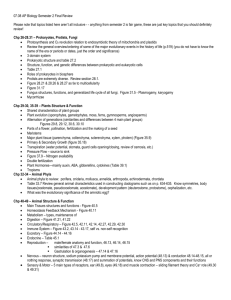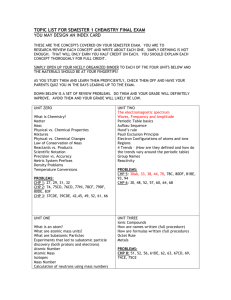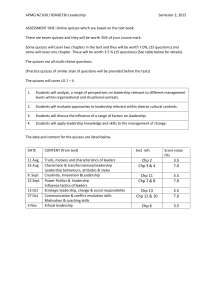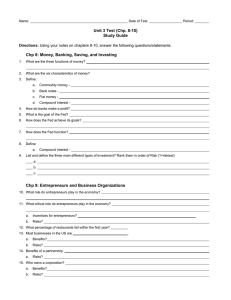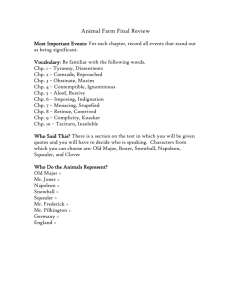PRINCIPLES OF MANAGERIAL ACCOUNTING 202-060 Instructor Course Description
advertisement
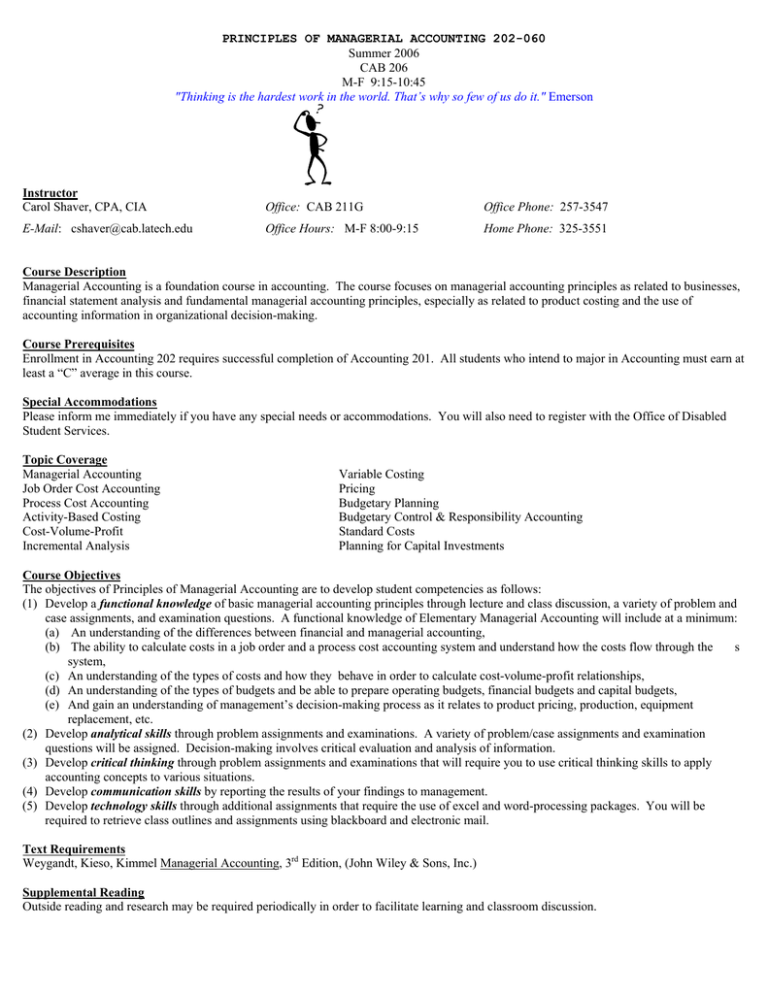
PRINCIPLES OF MANAGERIAL ACCOUNTING 202-060 Summer 2006 CAB 206 M-F 9:15-10:45 "Thinking is the hardest work in the world. That’s why so few of us do it." Emerson Instructor Carol Shaver, CPA, CIA Office: CAB 211G Office Phone: 257-3547 E-Mail: cshaver@cab.latech.edu Office Hours: M-F 8:00-9:15 Home Phone: 325-3551 Course Description Managerial Accounting is a foundation course in accounting. The course focuses on managerial accounting principles as related to businesses, financial statement analysis and fundamental managerial accounting principles, especially as related to product costing and the use of accounting information in organizational decision-making. Course Prerequisites Enrollment in Accounting 202 requires successful completion of Accounting 201. All students who intend to major in Accounting must earn at least a “C” average in this course. Special Accommodations Please inform me immediately if you have any special needs or accommodations. You will also need to register with the Office of Disabled Student Services. Topic Coverage Managerial Accounting Job Order Cost Accounting Process Cost Accounting Activity-Based Costing Cost-Volume-Profit Incremental Analysis Variable Costing Pricing Budgetary Planning Budgetary Control & Responsibility Accounting Standard Costs Planning for Capital Investments Course Objectives The objectives of Principles of Managerial Accounting are to develop student competencies as follows: (1) Develop a functional knowledge of basic managerial accounting principles through lecture and class discussion, a variety of problem and case assignments, and examination questions. A functional knowledge of Elementary Managerial Accounting will include at a minimum: (a) An understanding of the differences between financial and managerial accounting, (b) The ability to calculate costs in a job order and a process cost accounting system and understand how the costs flow through the s system, (c) An understanding of the types of costs and how they behave in order to calculate cost-volume-profit relationships, (d) An understanding of the types of budgets and be able to prepare operating budgets, financial budgets and capital budgets, (e) And gain an understanding of management’s decision-making process as it relates to product pricing, production, equipment replacement, etc. (2) Develop analytical skills through problem assignments and examinations. A variety of problem/case assignments and examination questions will be assigned. Decision-making involves critical evaluation and analysis of information. (3) Develop critical thinking through problem assignments and examinations that will require you to use critical thinking skills to apply accounting concepts to various situations. (4) Develop communication skills by reporting the results of your findings to management. (5) Develop technology skills through additional assignments that require the use of excel and word-processing packages. You will be required to retrieve class outlines and assignments using blackboard and electronic mail. Text Requirements Weygandt, Kieso, Kimmel Managerial Accounting, 3rd Edition, (John Wiley & Sons, Inc.) Supplemental Reading Outside reading and research may be required periodically in order to facilitate learning and classroom discussion. Written Communications At least 10% of your grade will be determined from written communication. The purpose of this requirement is to test your understanding of key concepts and to improve written communication skills. My Mission To create a learning environment so that you can master the course content and actively apply with confidence what is learned. Falling behind is the most common cause of poor performance. You should read and study each chapter before it is discussed in class. It would be beneficial for you to work extra problems or exercises from the text equal to the number worked in class or assigned for homework. Doing so will allow you to gain more from the classroom discussions and facilitate successful completion of the course. Statement of Ethics and Scholastic Dishonesty The accounting profession has a long-established reputation for its high level of ethical conduct. This reputation reaches into the academic arena where the profession’s future leaders are being prepared. Academic dishonesty will not be tolerated in accounting courses. Academic dishonesty includes, but is not limited to copying, sharing or obtaining information from any unauthorized source during examinations or quizzes. It also includes copying from or unauthorized sharing of homework assignments, attempting to take credit for the intellectual creation of another person, or falsifying information. Any student involved in academic dishonesty will be penalized in accordance with published University rules. Honor Code Go to blackboard, sign the honor code statement and drop in the Digital Drop Box by mid-night, July 12th for a 5-point bonus. Attendance Requirements Regular attendance is required in this course and will be checked each class meeting. The class attendance policy as stated in the 2005-2006 Louisiana Tech University Bulletin will be followed. Cell Phone Please turn your cell phone off or to silent mode during class period. Due to the picture-taking ability of cell phones, they must remain in your book bag, pocket or purse during class. Grading System Grading Scale: Grades based on total points using 10-point scale. (90%=A, 80%=B, 70%=C, 60%=D, Below 60%=F) Regular Exams: There are three regular exams valued at 100 points each. Final Exam: The final exam is comprehensive over Chapters 1-10 and worth 100 points. Quizzes: A number of 10-point quizzes will be given during the session. There will be no make-ups for quizzes, but your lowest quiz grade will be dropped. Homework Homework assignments are due on the date indicated on the syllabus and will be collected at the beginning of class. Collected assignments will be checked for effort and completeness. Each satisfactory homework assignment will be worth three points each. Late homework assignments will not be accepted. Projects Web Assignment BYP5-4 (10 Points) – Must be placed in the Digital Drop Box by midnight Friday, July 21st Managerial Analysis BYP9-2 (10 Points) – Must be turned in at the beginning of class on Tuesday, August 1st Case 7 (Page CA-28) Armstrong Helmet Company (40 Points) – Must be typed and turned in with Exam 3 on Friday, August 11th Make-up Policy No makeup exams will be given unless I have agreed in advance. Absolutely no makeups for missed quizzes, projects, or in-class work. Blackboard The syllabus, assignment sheet and other class information will be available on Blackboard. Test grades, quiz grades and final grades will be posted to Blackboard. The discussion board will be available for posting and answering questions. The Digital Drop Box on Blackboard will be used for turning in many of your assignments and projects. If you are unsure how to use Blackboard, please stop by my office. Accounting 202 Homework Assignment Schedule Topic Chapter Introduction/Managerial Accounting Chp 1 Managerial Accounting Chp 1 Job Order Cost Accounting Chp 2 Job Order Cost Accounting Chp 2 Process Cost Accounting Chp 3 Date 07/10 07/11 07/12 07/13 07/14 M T W R F Assignment Ex1-2 P1-2A P1-5A Ex2-7 P2-4A 07/17 07/18 07/19 07/20 07/21 M T W R F Process Cost Accounting Activity-Based Costing **Exam 1** Cost-Volume Profit Cost-Volume Profit Chp 3 Chp 4 Chp 1-4 Chp 5 Chp 5 Ex3-2 P3-5A P4-2A Ex5-2 BYP5-4 07/24 07/25 07/25 07/27 07/28 M T W R F Incremental Analysis Incremental Analysis Variable Costing Pricing Budgetary Planning Chp 6 Chp 6 Chp 7 Chp 8 Chp 9 P5-1A Ex6-1, Ex6-3 P6-4A P7-1A P8-2A 07/31 08/01 08/02 08/03 08/04 M T W R F Budgetary Planning Budgetary Control and Responsibility Accounting Review **Exam 2** **Final Exam** Chp 9 Chp 10 Ex9-2, Ex9-3 BYP9-2, Ex10-3 Chp 5-10 Chp 1-10 P10-1A Take-Home Project 08/07 08/08 08/09 08/10 08/11 M T W R F Standard Costs Standard Costs Planning for Capital Investments Planning for Capital Investments **Exam 3** Chp 11 Chp 11 Chp 12 Chp 12 Chp 11-12 Ex11-1 P11-1A Ex12-1 P12-1A Case 7


